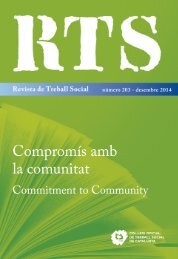Employmentweb_low
Employmentweb_low
Employmentweb_low
You also want an ePaper? Increase the reach of your titles
YUMPU automatically turns print PDFs into web optimized ePapers that Google loves.
EmploymEnT, woRk, and hEalTh inEqualiTiEs - a global perspective<br />
Table 1. cluster of countries based on labour market inequalities.<br />
CorE<br />
more Equal<br />
social Democratic labour<br />
Institutions<br />
Belgium, Denmark, finland, Italy,<br />
norway, sweden<br />
Corporatist Conservative labour<br />
Institutions<br />
austria, Germany, france,<br />
greece, Japan, netherlands,<br />
portugal, spain<br />
liberal labour Institutions<br />
less Equal<br />
australia, Canada, Ireland, new<br />
Zealand, switzerland, uK, us<br />
residual labour Institutions Emerging labour Institutions Informal labour market<br />
sEmI-pErIpHEry<br />
pErIpHEry<br />
The Bahamas, Croatia, Czech<br />
rep, Hong Kong, Hungary,<br />
Jamaica, south korea, latvia,<br />
lithuania, poland, Russia,<br />
singapore, slovak rep, slovenia,<br />
Thailand, uruguay<br />
post-Communist labour market<br />
albania, armenia, Belarus,<br />
Bolivia, Bulgaria, Cambodia,<br />
China, ghana, Indonesia,<br />
moldova, mongolia, papua new<br />
guinea, philippines, romania,<br />
Tajikistan, ukraine, uzbekistan,<br />
Viet nam<br />
argentina, Brazil, Chile,<br />
Colombia, Costa rica, Ecuador,<br />
fiji, Kuwait, malaysia, mexico,<br />
panama, paraguay, peru, south<br />
africa, Trinidad and Tobago,<br />
Venezuela<br />
less successful Informal labour<br />
market<br />
algeria, Cape Verde, Cote d'Ivoire,<br />
Dominican rep, Egypt, Equatorial<br />
guinea, guatemala, guyana,<br />
Honduras, india, Iran, Jordan,<br />
mauritania, morocco, nicaragua,<br />
nigeria, pakistan, sri lanka,<br />
sudan, swaziland, syrian arab<br />
rep, yemen rep<br />
Bahrain, Belize, Botswana, El<br />
salvador, lebanon, oman, saudi<br />
arabia, Tunisia, Turkey<br />
Insecure labour market<br />
Bangladesh, Benin, Burkina faso,<br />
Burundi, Cameroon, Central<br />
african rep, Chad, Comoros,<br />
Congo Dem rep, Congo rep,<br />
Eritrea, Ethiopia, gambia,<br />
guinea-Bissau, haiti, Kenya, lao<br />
pDr, madagascar, malawi, mali,<br />
mozambique, namibia, nepal,<br />
niger, rwanda, senegal,<br />
Tanzania, Togo, uganda, Zambia,<br />
Zimbabwe<br />
source: prepared by the authors<br />
The clustering of countries according to labour market<br />
characteristics varies greatly between periphery and semi<br />
periphery, on one hand, and oECD countries on the other. The<br />
labour markets of semi-peripheral countries are characterised by<br />
growing informality but maintain some degree of stability and rule of<br />
law, approximating them to wealthier oECD countries. some, such<br />
as Chile, have even developed their own forms of emerging welfare<br />
state institutions. Countries on the global periphery, however,<br />
represent another level of labour-market instability altogether.<br />
plagued by a heavy reliance on informal work, they face severe<br />
insecurity in their labour markets. In these countries war, political<br />
instability, authoritarian regimes, and foreign interventions threaten<br />
the rule of law and the protection of workers, and only aggravate<br />
their labour market problems (stubbs & underhill, 2006).<br />
This categorisation of countries reveals two very important<br />
distinctions. first, it highlights the difference between labour<br />
institutions and informal labour markets. labour institutions are<br />
closely related to the strength of the welfare state (Huber &<br />
stephens, 2001).<br />
56



